Repella Fella review
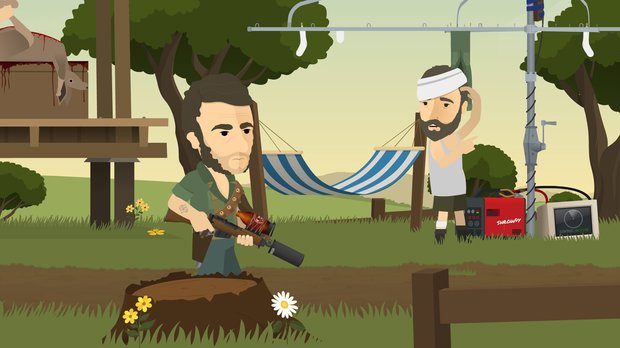
- 1 Comment
Hilarious, distinctly Aussie postapocalyptic comedy for those not turned off by violently dark humour
Repella Fella is the funniest game I have ever played. No notes.
Okay, I’ve been told I need some notes, but first, take twelve seconds to watch this clip of the opening credits. If that didn’t at least make you smile, you would probably be miserable playing the actual game. Everyone else, you’re in for a treat.
This is the first commercial enterprise by indie developer Misadventurous, a team of one that spent six years seeing Repella Fella to completion. If you played their hit Flash series Ray, you will have a good idea what you’re in for: a violent, darkly humorous choose-your-own-adventure-esque game using a South Park-style animation. But Repella Fella takes it a step further, adding puzzles, traditional adventure mechanics and excellent voice acting. While the storytelling is uneven at times, it is a delightful romp from beginning to end.
The year is 1968, and the nameless Australian protagonist who owns the eponymous exterminator agency is coasting through life to escape the trauma he suffered in the Vietnam war. While on a call to help a local business depose of a boar, he is alerted by air raid sirens and unwittingly discovers a submersible to narrowly escape the first moments of a nuclear holocaust. The submersible was designed for just this purpose, allowing the survivor to live underwater for 15 years until it is presumably safe to resurface, although it most certainly was never intended for him.
While passing the time, you are given the decision to hone your physical strength or your brain power by taking pills and doing the accordant exercises. Unbeknownst to our hero – referred to simply as “The Fella” – time is not meant to pass for him as it does for the rest of humanity, so he’s surprised when he’s returned to the surface long before he expected. However, not only did his isolation feel significantly shorter than fifteen years, a temporal error with the submersible has resulted in the year now being 2073. But before he has time to even realize this, a woman near the shore points a gun at his face.
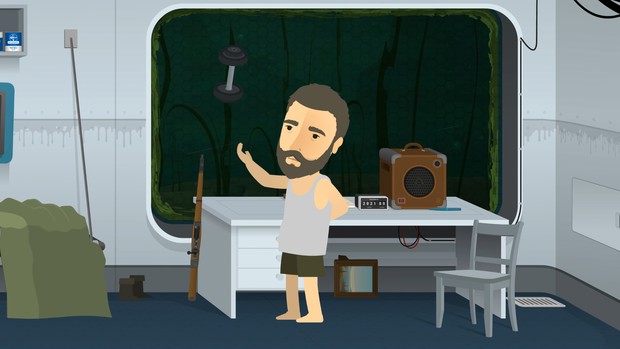
An in-game reference manual explains that other than the major islands of Oceania (where everyone fled to avoid the fallout), there does not appear to be any significant population centers left. Australia is controlled by several major factions (that seem to rely heavily on oppressive governing) with various nomadic groups that try to avoid ever-present armed authorities while scrounging for supplies and food. While some of the technology is quite advanced (and others, puzzlingly, quite retro), the most concerning byproduct of the nuclear contamination is the wildlife, where several hyper-aggressive species (such as the new koala, which is more terrifying than anything on Earth today) have emerged that pose a constant threat to those not behind city walls.
While you will mostly follow the exterminator throughout the game, you will also occasionally play as two women in competing factions (Matilda, an American, and Private Anya, a Russian) that are quite interested in him. Not only does he appear to have survived for over one hundred years under water, the aforementioned ability you chose while in the submersible is demonstrated in incredibly destructive ways that would grab the attention of any military.
After convincing the gun-toting woman, Alexandra, not to shoot him, The Fella reluctantly joins forces with her in a loosely outlined story with the eventual goal of reaching Sapporo, a Japanese settlement that is allegedly a democratic haven. Roadblocks are constant, however, as not only do the other government factions want to get their hands on our hero, but most citizens don’t trust the “bomb dodger” who didn’t have to suffer through the holocaust.
The side-scrolling game mechanics are exceedingly simple and can be done effortlessly with the mouse and keyboard or gamepad (though the game insists that real fellas eschew the gamepad). Interacting with people or objects is as simple as a click that elicits character commentary or brings up a menu of options. For example, if facing an enemy, the menu may present you with three possible ways to defeat them, sometimes with guile, often with extraordinary violence. One of the options may be grayed out, depending on choices you’ve made previously that affect your abilities or your inventory. While you can view your inventory, unlike your typical adventure game you don't manually use items; rather, they simply affect your options for various puzzles. There are several times where you'll have no idea when an item may come into play, but thankfully The Fella has no scruples and will gladly pick up random things just in case.
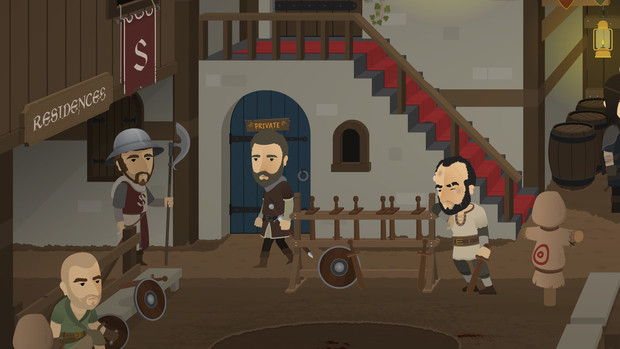
After selecting an option, an animation will show you the results. It is possible to die, but should this occur, you are simply brought back to the moment right before to try again. There is no way to get stuck, but it’s fun to see alternate solutions that await you by making different choices. Unfortunately, the only save slots are the most recent automatic checkpoint and the last one you initiate, necessitating playing the game in its entirety at least one more time (if not a third time) to see everything there is to see.
While all puzzles follow this simple choice-driven format, many choices (and in turn, several subplots) are not available unless you carry out certain tasks or find items in a particular order, encouraging you not to mindlessly click on everything if you want some control over the outcome. A journal keeps track of both mandatory and optional goals, and those who take time to casually explore areas rather than rush through them will be rewarded with additional story and some fantastically silly jokes. An optional hotspot indicator is useful to discovering some of the more obscure paths.
Two repeating mini-games—lock-picking and terminal hacking—are not terribly exciting (nor terribly difficult, especially with an option to make them easier) in and of themselves, but additional puzzle options and story lines become available should you succeed. You will also be carrying a tape deck, which apparently is the primary method of recording in the postapocalyptic wasteland of 2073. Tapes are strewn about everywhere that reveal history and secrets of other characters you meet along the way. While these are also optional, finding them provides significant insight into the world around you while also occasionally expanding some puzzles.
Of course, all of the preceding praise is moot if you don’t find the game funny. It is both profane and graphic. The C-word (vulgarity warning: real version to follow!) is used frequently, and while it’s never used to degrade women (in fact, none of the humor is mean-spirited), if it turns you off you’ll be hard pressed to make it through. One notable example is when you need to climb a building and serve temporarily as a sniper. One of the grayed-out options is “Take a trained shot” while the available option is to “Shoot like a shit cunt.” How does one get trained to be a sniper? Find a book entitled “How to not shoot like a shit cunt.” Naturally!
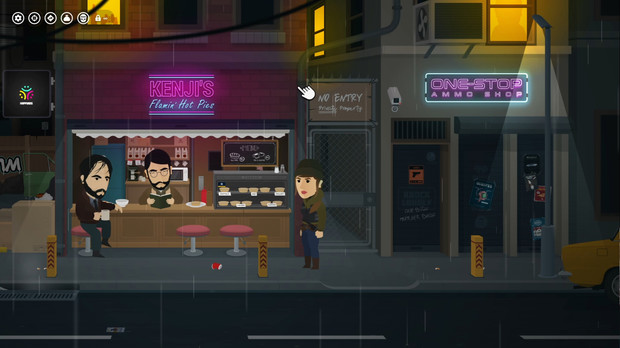
Gore is featured liberally as well: be prepared to see plenty of blood, decapitations, and human innards strewn about, with you personally being the cause of most of it. While occasionally excessive, there’s actually a reason for it that’s integral to the plot. The cartoonish violence is generally done for laughs, and in between the characters have earnest conversations that give them some humanity and provide respite to the player.
The animation style is clearly inspired by South Park, with two-dimensional cartoony characters sporting oversized heads and moving around in a stilted manner. The background graphics are colorful and easy to discern but quite low in detail. Lest that sound like a criticism, I was often charmed by the simplicity and it helps make all the carnage more palatable. The home of American agent Matilda is realized in a modern but bleak and gritty style, with street robot security guards and apartments armed with turret guns to punish minor infractions. Meanwhile, the Russian colonial fort of Shambletown replete with parapets, a castle, and street markets is drawn in softer tones. My only minor graphical complaint is a glitch I encountered several times in my second playthrough, where miniature non-interactive copies of various characters were randomly spread throughout a scene.
The casting and voice direction are masterfully done. Over 90 actors are utilized, and in general they are voiced by native speakers, with the Russian characters often speaking in Russian (when they don’t want you to know what they’re saying). The game’s designer Phill Collins voices The Fella himself and delivers an understated, hilarious performance that serves as the linchpin given it comprises well over half of the game’s dialogue. I also quite enjoyed Emily Goeman’s sassy performance as Matilda.
An original recording of the Australian folk song “Waltzing Matilda” highlights the musical score, though the other upbeat background tracks are neither intrusive nor memorable. What is impressive are the more than 2,500 sound effects that punctuate every action. Whether you’re assassinating a nimbin (one of those new species) or tearing off a guy’s limb in an arm wrestling match, rest assured you’ll be audibly rewarded.
My main criticism of Repella Fella is the uneven gameplay implementation. There are uncomfortably long exposition dumps in cutscenes that could have been paced with more player interactivity. Sometimes you are prompted to make a choice, but this will be followed by even more cutscenes. The most engaging parts of the game are the areas where you can walk around and explore, and when I wasn’t doing that I found myself getting restless. The ending is also quite abrupt, answering no questions while clearly suggesting a sequel. While I sincerely hope that comes to fruition (and if so the designer does promise more interactivity), that doesn’t make the outcome here any more satisfying.
Final Verdict
As a reward for those still reading, I’ll point out that the designer has released a fully functional free version of the game that also includes a pirate-themed song and an additional post-credits scene. Why, you ask? He says he used to pirate games because he was poor and wants people in the same situation to enjoy his game guilt-free. Of course, he encourages everyone to buy the game if they can so he can afford to work on a sequel. I strongly recommend the same, because comedy may be the hardest genre to pull off successfully, and Repella Fella is a shining example in the adventure game catalog. Every scene, every line of dialogue, every narration, and every background is meticulously designed to elicit a smile or a laugh, at least from those who are into unapologetically raw, edgy, often crude humor. And with few exceptions, I did so for ten straight hours until I reached the end, and I couldn’t wait to dive back in to try out new paths a second time through. Some lulls in interactivity and a lackluster ending will hopefully be remedied if a higher-budget sequel gets made, but even if it’s more of the same, I’ll be first in line to buy it.
Hot take
Laughs are at the forefront of Repella Fella, a crude, gory, and yet occasionally earnest adventure. Ease of play allows the jokes to come fast and furious, and despite some issues with the pace of storytelling, this game is sure to provide hours of delight to its intended audience.
Pros
- Relentlessly funny and never mean-spirited
- Very easy to pick up and play while still providing a decent amount of interactivity
- Exceptionally well cast and acted, with the main character the highlight
Cons
- Storytelling is uneven, with several long periods of exposition
- Only one save slot
- Copious cursing, violence, and gore may turn off some players
Beau played Repella Fella on PC using a review code provided by the game's publisher.



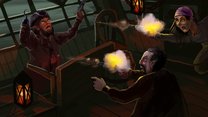


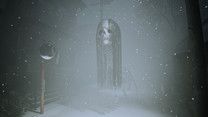

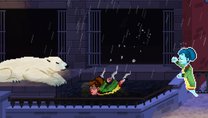

1 Comment
Want to join the discussion? Leave a comment as guest, sign in or register in our forums.
This sounds like such a unique mix of Aussie humor and postapocalyptic chaos! Dark comedy done well can be so refreshing—definitely intrigued to see how it balances laughs with the violent twists.
Reply
Leave a comment